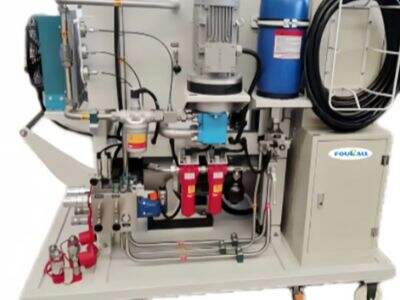NanJing Fourall은 우리 행성을 위해 헌신하는 회사입니다. 그들은 좋은 생태 시스템과 솔루션을 갖춘 유압 시스템을 설계하기 위해 노력하고 있습니다. 유압 시스템은 다양한 작업을 완료할 수 있게 해주기 때문에 필수적입니다. 하지만 이러한 시스템들이 과거에는 자연과 지구에 그렇게 좋지 않았습니다.
과거에 유압 시스템은 엄청난 에너지를 소비하고 많은 오염을 발생시켰습니다. 이러한 오염은 우리가 호흡하는 공기와 마시는 물을 파괴할 수 있습니다. 그러나 이러한 해결책들은 이미 오래전에 구식이 되었고, 이제는 훨씬 더 지속 가능하고 친환경적인 새로운 아이디어와 기술들이 등장했습니다. 예를 들어, 생분해성 유압유를 사용할 수 있습니다. 이는 필요 없을 때 자연적으로 분해되어 환경에 해를 끼치지 않습니다. 이는 우리가 과거에 사용하던 기존의 유압유와 비교했을 때 매우 중요합니다. 기존의 유압유는 지구와 그곳에 서식하는 야생동물들에게 상당한 피해를 줄 수 있기 때문입니다.
환경 영향 줄이기
하이드라울릭 시스템은 다양한 방법으로 활용됩니다. 예를 들어, 다리 건설에 도움을 주고 무거운 기계를 운반하는 데 사용됩니다. 이러한 작업들은 우리의 사회와 삶에서 매우 중요합니다. 하지만 이 작업들을 수행하면서 환경을 파괴하지 않아야 합니다. 이것이 바로 NanJing Fourall이 하이드라울릭 시스템의 부정적인 영향을 최소화하는 데 초점을 맞추고 있는 이유입니다. 우리는 기계의 성능을 저하시키지 않고 이를 실현하고자 합니다.
우리는 주변 자연과 매우 가까워질 수 있는 다양한 필터를 사용할 수 있습니다. 이 필터들은 하이드라울릭 오일을 깨끗하게 유지하고 오염물질로부터 보호합니다. 오일이 오염되지 않으면 더 오래 그리고 더 효과적으로 사용할 수 있습니다. 또한 에너지를 절약하고 환경 오염을 방지합니다.
효율적이고 환경 친화적인 방법으로 실행하기
우리는 난징 포올에서 유압 시스템이 효율적이면서도 환경 친화적이어야 한다고 우선적으로 생각합니다. 이는 우리가 역할을 적절히 수행하면서도 생태적으로 친화적인 시스템을 제공한다는 것을 의미합니다. 우리는 이를 위해 작업 중 시간이나 자원을 허비하지 않도록 하려고 합니다.
그리고 우리의 유압 시스템에 대해 긍정적인 방법 중 하나는 재생 가능 에너지를 사용하는 것입니다. 재생 가능 에너지는 고갈되지 않는 출처로부터의 에너지입니다. 즉, 예를 들어 태양광 등이 있습니다. 예를 들어, 우리는 태양광 패널을 사용하여 유압 시스템을 구동할 수 있습니다. 이것은 오염을 줄이고 우리 아름다운 행성을 보호하기 위한 놀라운 접근 방식입니다. 태양 에너지를 활용함으로써 우리는 탄소 배출량, 즉 우리가 배출하는 총 온실가스를 줄일 수 있습니다.
에너지 이용 최적화 기술
기술은 끊임없이 발전하고 있으며, 난징 포올에서는 항상 최첨단을 유지하기 위해 노력하고 있습니다. 최신 기술을 사용하여 지속 가능한 유압 시스템, 공압식 압력 해제 밸브 시스템을 설계하는 데 전념하고 있습니다.
우리가 활용하고 있는 새로운 흥미로운 기술 중 하나는 전기-유압 하이브리드 시스템입니다. 이 시스템은 전기와 유압 파워를 결합하여 지속 가능성과 에너지 효율성을 채택했습니다. 그 적용 범위는 건설 현장이나 운송 서비스 등 다양한 시나리오를 포함합니다. 이 기술은 우리 모두에게 더 효율적이고 지속 가능한 미래를 구축하는 데 도움을 줄 것이며, 이 시스템은 그런 예 중 하나입니다.
더 깨끗하고 녹색의 산업에서 일할 수 있는 기회
난징 포올에서는 유압 산업 전체가 더 깨끗하고 녹색의 미래로 나아가야 한다고 믿습니다. 우리는 혼자서 이를 이루기는 어렵지만, 더 나은 세상을 만드는 데 우리의 역할을 다하려고 결심했습니다.
이것은 우리가 효율적이고 지속 가능한 하이드라울릭 시스템을 생산하기 위한 새로운 방법을 끊임없이 탐구하고 있음을 의미합니다. 우리는 기계의 전원으로 재생 가능 에너지를 사용하고 다른 회사 및 단체들과 협력하여 환경 지속 가능성을 발전시키려고 계획하고 있습니다. 모두가 함께 일하고 아이디어를 공유하면 미래의 하이드라울릭 산업은 더 깨끗하고 녹색이 될 것입니다.
 EN
EN
 AR
AR
 FR
FR
 DE
DE
 HI
HI
 IT
IT
 JA
JA
 KO
KO
 PT
PT
 RU
RU
 ES
ES
 TR
TR







